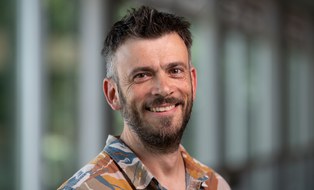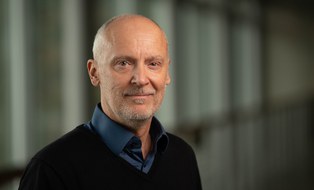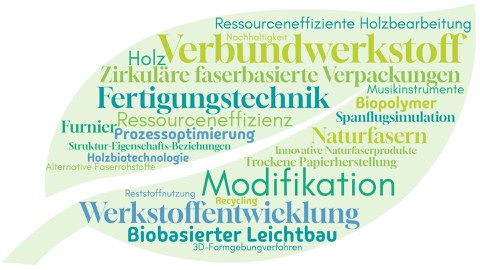Areas of Research
The core research areas of the Chair of Wood Technology and Wood-based Bioeconomy are derived from the research interests of Prof. Dr. Alexander Pfriem and his research associates.
The Chair is unique in its form in Germany, as it thematically covers both material production and the entire material processing chain through to the finished product (furniture, construction elements, packaging and other products from the wood and paper industry as well as related industries). In addition, composite materials that are not based on wood or lignocellulosic materials are also researched and developed.
The word cloud provides an insight into the diversity of the research areas.
In order to structure the diversity of research interests, these are currently grouped into five interdisciplinary research fields.
Research fields at the Chair
The Natural Fiber Composites and Biocomposites Research Group goes back to the roots of the Chair of Wood Technology and Wood-based Bioeconomy. Over half a century ago, in addition to wood and wood fibers, other natural fibers were also the subject of research for use in modern composite materials. Today, application-related fiber materials are developed on the basis of fibers from renewable raw materials, but also on the basis of rock fibers, for example. One focus is on research into moldable natural fiber-plastic composites, which can be processed from granulates into finished products and components using established plastics processing techniques.
Focus areas:
- Processing of short fibers, fabrics and woven fabrics with polymers and biopolymers into NFRP/WPC or organic sheets
- Use of fibers from annual plants, wood, basalt and cellulose fibers
- Development of new raw material sources as reinforcing fibers (residual materials)
- Development of lightweight construction solutions (bio-foams, organic sheets, veneer composites)
Contact person:
 © Sven Ellger
© Sven Ellger
Forschungsgruppenleiter
NameMr Dr.-Ing. Sebastian Siwek
Send encrypted email via the SecureMail portal (for TUD external users only).
Holztechnologie und holzbasierte Bioökonomie | MAR 32
Holztechnologie und holzbasierte Bioökonomie | MAR 32
Paper technology has a long tradition at TU Dresden. This research area is integrated within the Institute of Natural Materials Technology. In terms of subject and organization, Paper Technology is assigned to the Chair.
The core research areas include paper fiber production and preparation, paper production and finishing, as well as paper processing including printing technology. The focus is on the new and further development of technologies to reduce the specific energy and water requirements of preparation and manufacturing processes, among other things to reduce theCO2 footprint. Furthermore, new areas of application for cellulose-containing materials in functional layers or new products are being developed and existing technologies are being further developed and adapted for other areas of application.
Basic and applied research:
Technology
- Improving energy efficiency / reducing theCO2 footprint
- Production of energy-efficient high-yield fiber materials
- Dry processing and production of paper and cardboard
- Cross-industry technology application
- Process modeling and optimization
Products
- Increasing the added value of forest-based products
- Material use of residual materials from the paper industry (cascade use)
- Composite materials based on natural fibers or paper pulp
- Ceramic composites for special applications
- Formed products by thermoforming paper and cardboard
Analytics
- Metrological recording of raw material and paper parameters
- Development of measuring methods and devices
- Prediction of paper-side influences on product quality
Raw materials
- Optimizing the use of waste paper for an improved raw material balance
- New raw materials for paper fiber-based products
-
entsprechend der Roadmap 2050 / according to the Roadmap 2050
Contact person:
Arbeitsgruppenleiter
NameMr Dr.-Ing. Roland Zelm
Lehre und Forschung Papiertechnik
Send encrypted email via the SecureMail portal (for TUD external users only).
Holztechnologie und holzbasierte Bioökonomie | MAR 39
Holztechnologie und holzbasierte Bioökonomie | MAR 39
The solid wood/veneer research group is dedicated to topics relating to the natural material wood in its native form as well as modern solid wood composites. The modification of natural properties such as swelling and shrinkage behavior, moisture absorption, strength, hardness, color, etc. through thermal, mechanical, chemical and biological modifications and their combinations bring improvements in the use of wood and veneers as construction and interior finishing products as well as products for everyday life and in the living environment of people.
Focal points:
- Thermal modification of solid wood, veneer, bamboo
- Chemical-mechanical modification of solid wood
- constructive tempering through material combination
- Material behavior of veneers
- Material developments for musical instruments
Contact person:
Forschungsgruppenleiter
NameMr PD Dr.-Ing. habil. Mario Zauer
Send encrypted email via the SecureMail portal (for TUD external users only).
Holztechnologie und holzbasierte Bioökonomie | MAR 32
Holztechnologie und holzbasierte Bioökonomie | MAR 32
The focus of the Production Engineering research group is on manufacturing processes in their application to wood and wood-based materials as well as other composite and biomaterials (sandwich materials, paper, cardboard and paperboard materials, etc.).
Traditionally, cutting and joining processes, but also handling processes, are the focus of research and development with the aim of developing new technologies, improving processing quality, increasing energy and resource efficiency and protecting people and the environment.
Special process and tool developments are dedicated to questions and the further development of the state of the art with regard to current lightweight material composites and material processing in furniture construction, in the production of construction elements, but also in other manufacturing sectors of the wood industry and beyond.
A particular focus of the research group is the processing of natural fiber-based materials such as paper for the development of innovative sandwich core materials. In addition to its research activities, the group is also involved in standardization and guideline work.
Focus areas:
- Cutting and joining processes (machining and bonding processes, chip collection)
- Process development (honeycomb panels, hardware setting, narrow surface coating)
- Tool development (milling tools, tools for sandwich materials)
- Material processing (wood, fiber, bio, sandwich core, paper materials)
Contact person:
 © Sven Ellger
© Sven Ellger
Forschungsgruppenleiter
NameMr Prof. Dr.-Ing. Christian Gottlöber
Koordination Lehre; Forschung Fertigungstechnik
Send encrypted email via the SecureMail portal (for TUD external users only).
Holztechnologie und holzbasierte Bioökonomie | MAR 32
Holztechnologie und holzbasierte Bioökonomie | MAR 32
Wood-based materials and insulating materials as well as related lignocellulosic materials are developed and improved by an experienced research group at the Chair of Wood Technology and Wood-based Bioeconomy. The focus is not on existing mass-produced materials such as chipboard or medium-density fiberboard, but on biomaterials with special properties and special applications or novel applications. In this context, in addition to wood fibers, other lignocellulosic materials and residues are also the subject of research.
Basic and applied research:
- Material development
- Process development and optimization
- Development of new bio-based raw and residual material sources
- Biological modification of wood-based materials and fiber materials
- Basic research
Contact person:
Forschungsgruppenleiter
NameMr Dipl.-Ing. Sören Tech
Send encrypted email via the SecureMail portal (for TUD external users only).
Holztechnologie und holzbasierte Bioökonomie | MAR 32
Holztechnologie und holzbasierte Bioökonomie | MAR 32


